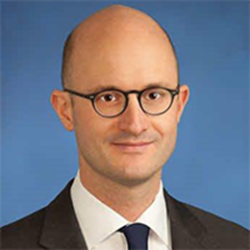Meet Robin Brooks

The Global Economy and Development program is pleased to welcome Robin Brooks to the Brookings Institution as a senior fellow starting in March. Robin has over two decades of experience in global macroeconomics and international finance, having worked for multilateral institutions, the private sector, and nonprofit organizations.
He joins the Global program from the Institute of International Finance, where he was chief economist and managing director. In this role, Robin led research on key macro topics, including the recovery of the global economy post-COVID, drivers of capital flows to emerging and frontier markets, and effectiveness of Western sanctions on Russia. Prior to the Institute for International Finance, Robin was the chief foreign exchange strategist at Goldman Sachs, where he led the firm’s research on exchange rates and global capital flows. Prior to that, he worked at Brevan Howard Asset Management and the International Monetary Fund.
He has published widely, presented at various high-level policy forums such as the G20, and engaged with a wide range of policymakers, private sector leaders and investors, and other key stakeholders. He is also frequently cited in top-tier media, such as the Wall Street Journal, Financial Times, and New York Times.
Robin holds a doctoral degree in economics from Yale University and a Bachelor of Science in monetary economics from the London School of Economics.
We are very excited to welcome Robin to the Global program and to Brookings. He brings a unique mix of talent combining strong technical ability and deep practical experience and is a well-respected thought leader who will add to our expertise in international finance and macroeconomics.
Brahima S. Coulibaly, Vice President, Global Economy and Development, Brookings
Q&A
This week, Esther Lee Rosen, director of communications at Global, had the opportunity to sit down with Robin for his views on the state of the global economy and financial system.
Esther Lee Rosen (ELR): Hello Robin. You come to Brookings with deep expertise in international finance and macroeconomics. As you know, the world has been grappling with a series of overlapping shocks, including the COVID-19 pandemic, the cost-of-living crisis, and geopolitical uncertainty. What is your assessment of the current state of global economy?
Robin Brooks (RB): First of all, I’m incredibly excited and grateful to be joining the Global Economy and Development program at Brookings. I can’t wait to work with the great team here and help shed light on the global economy. Speaking of which, on the surface, things look ok. The surge in inflation in the immediate aftermath of the COVID-19 pandemic is fading, and economic activity has withstood the tightening in global monetary policy, which was substantial. Markets are starting to price easier financial conditions as a result, which means that international capital flows to emerging and frontier markets are picking up again, which is good for growth in less developed parts of the world.
Beneath the surface, however, there are considerable risks. The first is that the “last mile” of disinflation is less straightforward than the decline so far, in extremis perhaps even forcing central banks to resume hiking. That would be a big shock for markets, which are pricing substantial central bank easing pretty much everywhere. The second is that the global recovery becomes increasingly uneven, with Europe and China falling further behind the U.S. This kind of divergence—especially where Europe is concerned—would be reminiscent of the post-2008 recovery, when it ultimately led the European Central Bank to embrace quantitative easing as the Federal Reserve was preparing to hike. That policy divergence supercharged the dollar, which could happen again, exacerbating the rise of protectionist sentiment in the U.S. The third is geopolitics, especially the U.S. election. Markets tend to be quite cynical about politics and discount a lot of what is said. But this election may be different, because it may have big implications for the war in Ukraine, not to mention U.S. relations with China. In short, the global picture is a lot more fragile than the current pace of growth suggests.
ELR: What is your outlook for capital flows to emerging and frontier markets in the global macroeconomic picture that you just painted?
RB: So, first of all, I think emerging markets deserve a lot of kudos for how they weathered the last couple of years. At the height of the pandemic, capital outflows from emerging markets were extreme and unprecedented. Yet most countries intervened only modestly, allowing their currencies to fall and shoulder much of the adjustment. That’s a big departure from the past, when “fear of floating” defined much of emerging markets. Once inflation started rising, many emerging market central banks were also faster to hike than their counterparts in advanced economies. On the whole, emerging markets have emerged from the COVID-19 shock with enhanced credibility in macroeconomic policymaking.
As far as capital flows go, there is obviously the constant up and down in flows that is driven by global financial conditions, with the path ahead for inflation—as I was just saying—the principal driver. But beyond this cyclical story there is something novel and more interesting going on. For the past decade, markets have been infatuated with China, which attracted capital inflows at the expense of emerging and frontier markets. That infatuation ended with Russia’s invasion of Ukraine, since there have been uninterrupted outflows as global investors look at China in a new light. This is a structural positive for emerging markets, especially given enhanced policy credibility in many places. It’s also a positive for frontier markets.
ELR: You’ve done a lot of work on Western sanctions on Russia. Can you talk about that?
RB: I’m a big fan of Western sanctions and think that they have weakened Russia. But that doesn’t mean we shouldn’t examine shortcomings and see what can be improved. Let me give two examples. The first involves the G7 oil price cap on Russia, which has been weakened by opposition from Greek ship owners, who happen to own a big chunk of oil tanker capacity out of Russia. These owners pushed for a higher level of the cap—giving Russia more money for every barrel of oil it exports—and sold many of their ships to Putin’s shadow fleet. The second involves exporters across Europe, who—in the wake of Russia’s invasion of Ukraine—began to export goods to Central Asia and the Caucasus, with Russia likely the final destination. This kind of trade diversion has offset roughly one-quarter of the drop in direct exports to Russia. Both examples have vested interests in common, those who—mostly for the profit motive—oppose sanctions. We need to learn from the Russia example how better to deal with such vested interests in our own ranks, to ensure that our sanctions policy is as effective as it needs to be.
ELR: If I can now switch to your research agenda at Brookings, what are some of the issues you plan to focus on in the coming months?
RB: Let me say again how excited I am about coming on board. Here are three examples of things I’m working on. First, the “last mile” argument—the idea that the final stage of disinflation in the U.S. is harder than disinflation we’ve already seen—is critical for policymakers and markets. I’m working on a paper to see if there is any evidence to back up this “last mile” view, weighing further disinflation from the continued unwinding of COVID-19 supply chain disruptions against other factors such as the relatively tight labor market. Second, I am working on a paper with Eswar Prasad, also a senior fellow in the Global Economy and Development program, that examines why more capital isn’t flowing to emerging and frontier markets. The angle we explore focuses on exchange rate devaluations and whether those should be used more actively to attract capital inflows and boost growth. Third, the efficacy of sanctions on Russia is absolutely critical, both because it matters so immediately for the war in Ukraine, but also because our sanctions policy is supposed to deter other bad actors. I have done lots of work on trade diversion of Western goods through Central Asia, the Caucasus, and Belarus and am hoping to write that up.
ELR: Thank you, Robin. This all sounds exciting, and we are so pleased to have you join Global! We look forward to sharing your research and analyses with our broader audience.





Commentary
Capital flows and the global economy—Welcoming Robin Brooks to Brookings
February 26, 2024